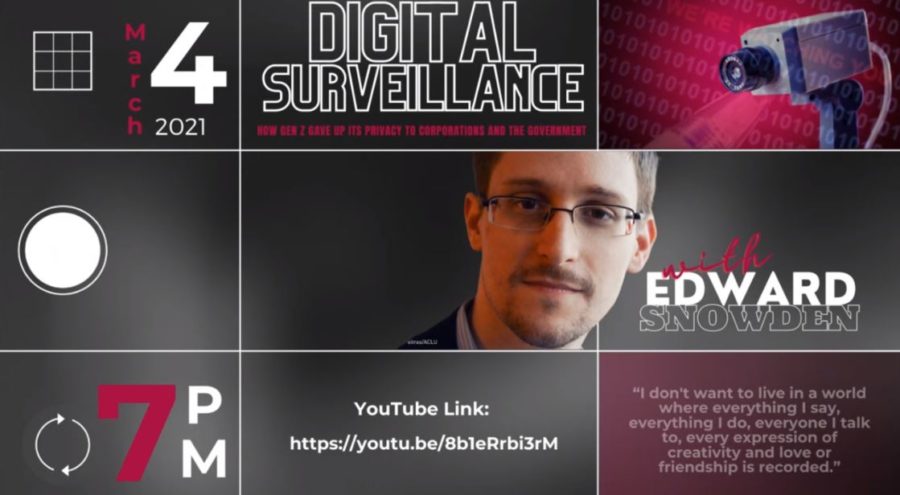Edward Snowden lectures on digital surveillance and Gen Z to Iowa State students
March 4, 2021
Edward Snowden lectured on cybersecurity in the digital age on a YouTube live stream on Thursday from Moscow.
In 2013, Snowden became widely known for blowing the whistle on the National Security Agency (NSA) mass surveillance systems while he was employed for the CIA. He believed these surveillance systems to be a massive breach of American privacy and exposed the NSA to different journalism outlets.
This led to a discussion around the ethics of whistleblowing and the ethics of the government surveillance systems as well.
In September 2020, the mass surveillance program Snowden revealed was found to be illegal in appeals court, according to Reuters.
Snowden started his presentation off by saying security of society and security of the state are two separate things.
“What we are seeing today, all the problems that have arisen with hacking and surveillance, manipulation and influence campaigns, are interrelated to the lost cause of unifying these two poles of this common civilization that we all share,” Snowden said.
He also said that when giving information to governmental entities, one often doesn’t have a choice but to supply them with personal information. He referred to the release of personal information to an unauthorized biography of a user’s life.
“Ask yourself, who is it that the law serves,” he said. “…What is legal is in many points of history distinct from what is moral.”
He said the Patriot Act protects mass surveillance guised under the term of bulk collection. This kind of mass surveillance has been around since 2001 and operated for 19 years before it was determined unlawful. The law previously forbid the practice of challenging the government on violation of the law, according to Snowden.
He said although this has been outlawed, surveillance is still being conducted by the government and corporate entities.
“What was previously secret […] has become for profit, has become available to law enforcement […] If you were born after 1987, AT&T has kept a record of every phone call that you’ve ever made,” Snowden said.
These records, according to Snowden, are metadata that includes who was on the receiving end of the call, their phone number, when they were called, the associated billing records and the length of the call.
“At every level, our state of being is being premised on the principle that the illusion of consent is as meaningful as the act of consent,” he said.
He compared the act of consent to creating a Facebook account. The user clicks “OK” to continue, which Facebook assumes is an agreement on consent to track people’s information. He said the universe exists upon connection and using the platforms to gain access to jobs, banking, connection and community, which people have to choose a solid “yes” or “no,” and at what point is it not an option to decline these terms?
“The cost becomes clear,” Snowden said. “Do you want a job? Yes or no? Do you want to eat? Yes or no? Ultimately you are being asked if you want to live or if you want to die. Click OK to continue.”
Snowden said that ultimately, this topic becomes a discussion on rights, and if a law is to protect anyone, it has to protect everyone.
“Rights do not exist to protect the majority,” he said. “If you have a popular opinion, if you have a popular movement, that’s not what the right is for because when you have the majority, you make the law. When you have the majority, you comprise the government […] in general, rights exist to protect the minority against the majority because the minority is where progress springs from.”

















